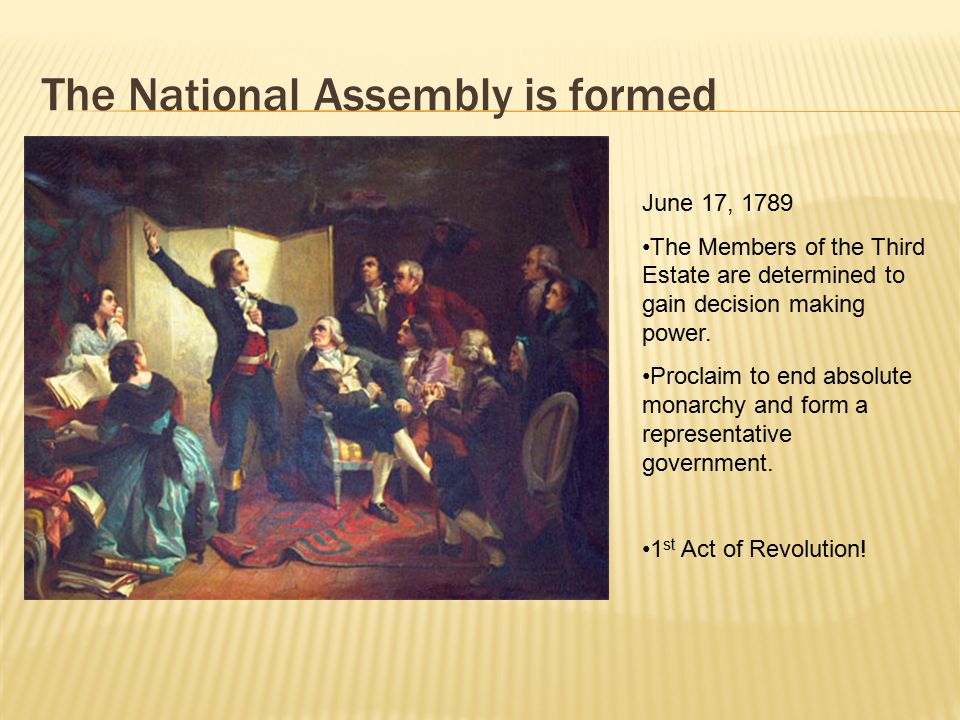The Third Estate formed the National Assembly because they were excluded from decision-making and wanted political representation. The Third Estate formed the National Assembly because they wanted political representation as they were excluded from decision-making.
During the French Revolution, the formation of the National Assembly by the Third Estate played a crucial role in challenging the existing political system. The grievances of the commoners, who constituted the majority of the population, had been escalating due to their exclusion from decision-making processes.
Frustrated with their lack of representation and recognizing the need for change, the Third Estate, comprised of peasants, workers, and the middle class, took matters into their own hands. By establishing the National Assembly, they sought to have a voice in shaping the future of France and addressing the socioeconomic disparities that plagued society. This significant step marked the beginning of a revolutionary journey towards a more inclusive and representative government.
The Third Estate Form the National Assembly Historical Background
The formation of the National Assembly by the Third Estate in France was a direct result of several historical factors. Firstly, during the Age of Enlightenment, revolutionary ideas began spreading across Europe, emphasizing the importance of individual liberty, equality, and popular sovereignty.
Secondly, the economic and social disparities in France were glaring, as the commoners (the Third Estate) were burdened with heavy taxes and financial hardships, while the clergy and the nobility enjoyed privileges and exemptions.
These disparities fueled resentment and a desire for change among the Third Estate. Furthermore, the successful outcome of the American Revolution served as a powerful inspiration for the French commoners, demonstrating that an oppressed population could overthrow an unjust system.
It was in this context that the Third Estate, representing the majority of the French population, decided to form the National Assembly in order to address their grievances and advocate for reform.
Pre-Revolutionary Events
The convening of the Estates-General marked a significant moment in the lead up to the formation of the National Assembly. The Third Estate, comprising the commoners, was dissatisfied with their representation in the Estates-General. They felt that their grievances were not adequately addressed by the first two estates – the clergy and the nobility.
In an attempt to find consensus, the Third Estate proposed voting by head rather than by estate. This suggestion aimed to give them a more proportional representation. However, their proposal was rejected.
The grievances of the Third Estate intensified as they faced economic hardship, taxation burdens, and lack of political power. Feeling marginalized, they decided to take matters into their own hands and formed the National Assembly, seeking to represent the interests of the common people.
This pivotal decision was a catalyst for the French Revolution, leading to widespread social and political transformations.
Formation Of The National Assembly
The National Assembly was formed by the Third Estate in response to the social and political inequality they faced. The Tennis Court Oath was a pivotal moment in this process, as it symbolized their determination to bring about change. In this oath, the delegates pledged to not disband until a constitution was established, effectively marking the beginning of the National Assembly.
The declaration made by the National Assembly further emphasized their commitment to represent the will of the people, declaring that sovereignty resided in the nation. This declaration effectively challenged the authority of the monarchy and laid the foundation for a more democratic system.
The transformation of the Estates-General into the National Assembly was a significant development in the French Revolution. It represented the emergence of a more representative and inclusive body, giving voice to the grievances of the Third Estate and paving the way for the radical changes that followed.
Tennis Court Oath
| The Tennis Court Oath was a defining moment in the formation of the National Assembly. |
| The delegates, denied access to their meeting hall, reconvened on a nearby tennis court. |
| There, they pledged to not disband until a constitution was established, solidifying their unity and determination. |
| The Tennis Court Oath signaled the resolve of the Third Estate to fight for their rights and challenge the traditional order. |
Factors Leading To The Formation
The formation of the National Assembly by the Third Estate was driven by a range of factors. Firstly, the lack of representation and unfair voting system were major contributors. The Third Estate, representing the majority of the population, had no real voice in the decision-making process, as the two other estates (nobility and clergy) held disproportionate power.
Additionally, the influence of enlightened thinkers played a crucial role. Ideas and philosophies advocating for equality and individual rights had permeated society, prompting members of the Third Estate to demand change and challenge the existing order.
Frustration with the absolute monarchy was another significant factor. The concentration of power in the hands of the monarch, who often ruled without considering the needs of the people, led to mounting discontent and a desire for a more inclusive and representative government.
Role Of The National Assembly
The National Assembly played a vital role in the French Revolution, particularly in drafting the Declaration of the Rights of Man and of the Citizen. This revolutionary document outlined fundamental rights and principles that aimed to safeguard individual liberties and promote equality.
The formation of the National Assembly also led to the establishment of a revolutionary government, as the Third Estate sought to challenge the privileged position of the nobility and clergy. Through legislative reforms and restructuring, the National Assembly aimed to transform French society and create a more equitable system.
By advocating for the rights of the common people and addressing social injustices, the National Assembly played a pivotal role in shaping the course of the French Revolution.
Implications And Impact
The formation of the National Assembly by the Third Estate had significant implications and impact, particularly in sparking the French Revolution. This event marked the emergence of a new political order, challenging the traditional power structure and paving the way for revolutionary movements globally.
The National Assembly represented the collective voice of the Third Estate, which comprised the majority of the French population. By uniting under the banner of the National Assembly, the Third Estate aimed to address their grievances and demand political representation and equality.
This bold move by the Third Estate ignited the French Revolution, as it defied the authority of the monarchy and questioned the existing social hierarchy. The formation of the National Assembly challenged the absolute power of the king and set the stage for radical changes within French society.
Furthermore, the ideals of the National Assembly resonated with revolutionary movements around the world. The French Revolution, with its calls for liberty, equality, and fraternity, inspired similar uprisings across Europe and the Americas, shaping the course of history.
The formation of the National Assembly thus had far-reaching implications, both in terms of transforming the French political landscape and influencing revolutionary movements globally.

Credit: slideplayer.com
Frequently Asked Questions For Why Did The Third Estate Form The National Assembly
Why Did The Third Estate Form The National Assembly?
The Third Estate formed the National Assembly because they were dissatisfied with the inequality and lack of representation in the Estates-General. They believed in creating a fair and equal society, where all citizens had equal rights and opportunities.
What Impact Did The Formation Of The National Assembly Have?
The formation of the National Assembly had a profound impact on the French Revolution. It marked the beginning of the end of absolute monarchy in France and paved the way for significant political and social reforms. The National Assembly became the driving force behind the revolution, leading to major transformations in French society.
What Were The Grievances Of The Third Estate That Led To The National Assembly?
The Third Estate had several grievances that led to the formation of the National Assembly. They were burdened with heavy taxation, lacked political representation, and endured social inequality. They sought to address these grievances and fight for their rights and interests through the National Assembly.
How Did The Formation Of The National Assembly Affect The Monarchy?
The formation of the National Assembly fundamentally challenged the power and authority of the monarchy. It shifted the balance of power in favour of the people and forced the monarchy to make concessions. This eventually led to the downfall of the monarchy, as the National Assembly sought to establish a more democratic system of governance.
Conclusion
The formation of the National Assembly by the Third Estate was a pivotal moment in French history. This decision came as a result of their unity and determination to bring about political change and overcome the injustices imposed by the monarchy.
By standing together and representing the voices of the common people, the Third Estate was able to challenge the status quo and lay the foundation for the French Revolution. This brave act of dissent continues to inspire and remind us of the power of unity in shaping the course of history.




